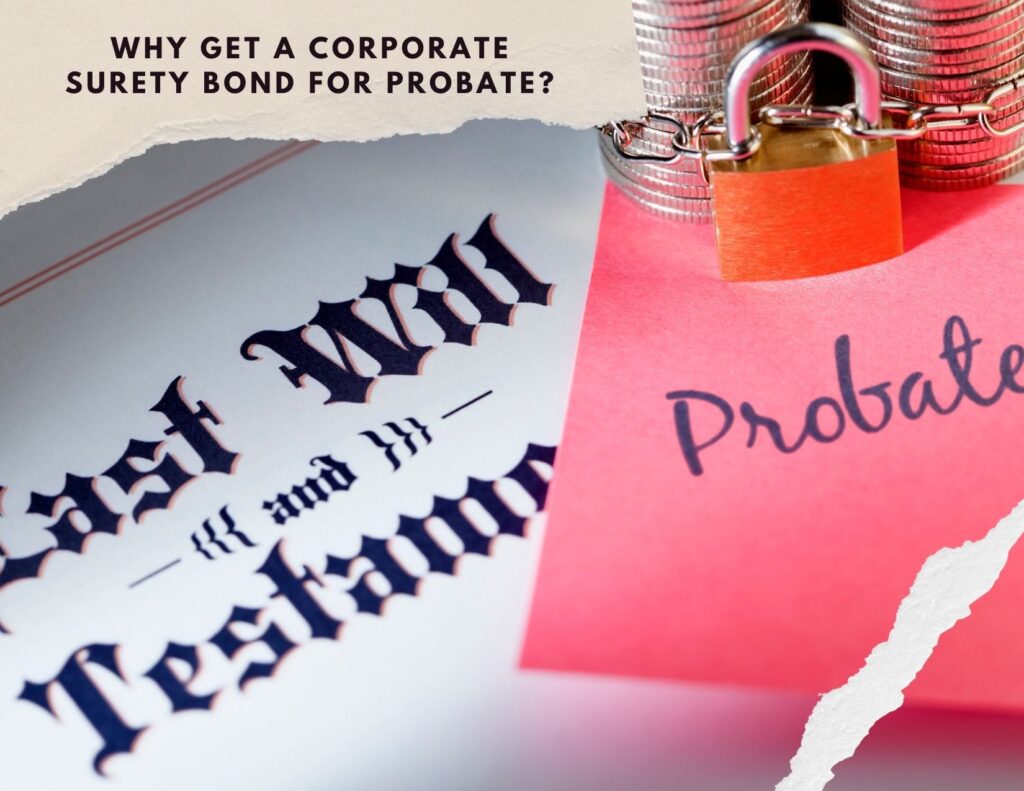When a loved one dies, their estate goes through probate to determine how the assets will be distributed. This process can be long and complicated, and it’s often helpful to have a corporate surety bond in place to help ensure that everything goes smoothly. In this blog post, we will discuss the benefits of getting a corporate surety bond for probate and how it can help make the process easier for everyone involved.

Tell me the probate bond?
The probate bond is a surety bond that is required by the court to protect the estate’s assets from being misappropriated. The bond is also known as a “fiduciary bond” or a “court-ordered bond.”
If you are named as the executor of an estate, you will be required to post a probate bond before you can begin administering the estate. The purpose of the bond is to protect the estate’s assets from being misused or stolen. The bond also serves as a way to ensure that you will fulfill your duties as executor in a timely and efficient manner.
The amount of the probate bond is set by the court and is based on the value of the estate’s assets. The bond must be posted before you can begin administering the estate.
Types of probate bonds
There are two main types of probate bonds: judicial and non-judicial. Judicial probate bonds are required when there is a dispute over the estate or if the court feels that the executor or administrator may not be able to properly handle the estate’s assets. Non-judicial probate bonds are not required by the court but may be requested by the beneficiaries of the estate.
- Administrator Bonds
Are a type of insurance that can be purchased by school districts to protect against financial losses arising from the wrongful acts of administrators. Administrator Bonds are not required by law, but they may be required by some school districts as a condition of employment.
- Guardianship Bonds
Are a type of insurance that can help protect your assets if you become incapacitated or otherwise unable to manage your finances.
- Executor Bonds
Are a type of surety bond that is required by many state courts for an executor to be appointed to administer a deceased person’s estate.
Fiduciary bonds for executors, administrators, guardians, and trustees
A fiduciary bond is a type of surety bond that is required by state law to serve in certain capacities. Executors, administrators, guardians, and trustees are all fiduciaries who may be required to post a bond. The purpose of the bond is to protect the beneficiaries of the estate, ward, or trust from any financial loss due to mismanagement or theft by the fiduciary.
Why do I need a probate bond?
If you are the executor of an estate, you may be wondering why you need to get a probate bond. The answer is simple: to protect the estate against any financial losses that may occur due to your mishandling of funds. Probate bonds are required by law in many states, and they must be filed before the estate can be settled.
What is a probate guarantee bond?
A probate guarantee bond is a type of court bond that is required to open up and administer an estate. The purpose of the bond is to protect the beneficiaries of the estate from any mismanagement or fraud on the part of the executor or administrator.
Basics of the Probate Process
Probate is the legal process of distributing a person’s assets after they die. The probate process can be complicated, and it often takes months or even years to complete. If you’re named as an executor in someone’s will, or if you’re the next of kin for someone who dies without a will, you may need to go through probate.
How can an insurance agent obtain a probate bond?
To obtain a probate bond, an insurance agent must first contact a surety company. The surety company will then require the agent to fill out an application and submit it for approval. Once the application is approved, the surety company will provide the agent with a probate bond.
How much does a probate bond cost?
A probate bond also called a surety bond, is a type of insurance that protects the heirs of an estate from any financial losses due to mismanagement by the executor. Probate bonds are typically required in cases where the estate is valued at over $100,000. The cost of a probate bond is based on the value of the estate and typically ranges from 0.75% to as high as 15%.
What are probate bond requirements?
If you are named as the executor of a will, or if you are appointed by the court to administer an estate, you may be required to post a probate bond. A probate bond is a type of surety bond that protects the estate’s beneficiaries from any financial loss caused by the executor’s misconduct.
What information is required for a Probate Bond Application?
The first thing you need to do is contact the court that will be handling the probate case and request an application. Once you have the application, you will need to gather the following information:
-The name, address, and phone number of the person who died (the “decedent”)
-The names, addresses, and phone numbers of the people who are appointed to handle the decedent’s estate (the “executors” or “personal representatives”)
-A copy of the death certificate
-The date of death
-The name and address of the bank where the decedent had an account
-The names and addresses of the decedent’s creditors, if known
-A list of the decedent’s assets and debts
Once you have gathered all of this information, you will need to fill out the application and submit it to the court. The court will then review the application and decide whether or not to grant you a probate bond.